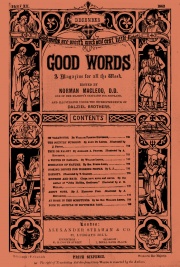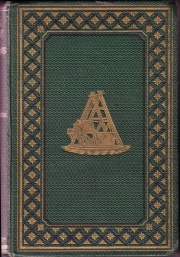The First Scientific Concept of Rockets for Space Travel by Robert Godwin Part 9
From The Space Library
Contents |
Back to Canada
Leitch returned to Canada in late 1861 having accepted his role at Kingston on a full time basis. On his departure from Scotland a dinner was held in his honour at the Royal Hotel in Cupar. When called upon to speak, Leitch expressed his high opinion of Canada before stating, “I shall have ample opportunity for carrying out the chief study of my life - the connection of science with religion.” Ministers from a multitude of denominations made flattering speeches and voiced their regret that he was leaving. One stated, “In the West Country, where he resided, he was regarded as one of the best artistic and scientific writers to the periodical press that they had at the present day.” [1]
By December 13th 1861 Leitch was back at his desk and writing to offer his assistance to Dr Egerton Ryerson in Toronto who was leading the charge regarding the problems with the University endowment. “Now that Canada is the Land of my adoption, I am ready to lend my aid in any way calculated to promote the elevation and efficiency, of our Educational Institutions.” [2]
It appears that he must have left another essay in the hands of his publisher in Scotland entitled “Uses of the Moon” which they printed in Good Words in February 1862. In this essay he investigated the effects that the moon has had on past and present society. Providing light in places without gaslights, operating the tides to flush rivers and keep them pure, providing a navigation beacon for determining longitude, and as an inspiration for lovers and poets. It is a simple and eloquent essay further proving the renaissance mind behind its composition. After assuming his role in Canada he also contributed to the noted multi-volume series The Imperial Dictionary of Universal Biography published by Mackenzie of London and Glasgow.
The University Question Continues
William Leitch’s life would never be easy. Having injured himself at a young age; married, only to have his wife and two sons die young; and then leaving his remaining two children in Scotland while he tried to make a difference in Canada; things were not going to get any easier for him.[3]
The series of political battles underway in the Canadian educational system never went away for Leitch. He proved that he was not only a brilliant advocate for science but he was also religiously enlightened. He made passionate speeches protecting the rights of people of all religions to be free to worship as they pleased. This attitude probably came from his upbringing as a member of the “anti-burgher” community in Scotland. His actions disproved the slurs made against him by certain people determined to maintain their stranglehold on the endowment. He tried to make peace with the powerful administrators of the Kings College and the University of Toronto. He became a member of the Senate of that seat of learning.[4]
All through the spring of 1862 Leitch sat on the senate board of the University of Toronto, voting on the day-to-day business of the institution as well as acting in a similar role at Queens. On June 7th 1862 he made a passionate speech at the Convocation of students in defense of the University disproving all of the spurious accusations made against him by those who branded him as a man who just wanted to dismantle the University in favour of denominational religious schools. The Globe newspaper would report of his performance.
“Rev. Dr. Leitch also replied. In the course of a remarkably good speech, the reverend gentleman said that one of the things which most surprised him when he first came to Canada, was the antagonism existing between the academical institutions of the country. He could not see, and did not now see why they should not form one great brotherhood, instead of being ranged in deadly hostility one against the other. (Loud cheers.) He argued with his colleagues of his own (Queen’s) college on this subject. He said, “Let me go up to Toronto and judge for myself, perhaps there are good fellows in Toronto.” They shook their heads very doubtfully, but he carried out his intentions, came to this city and exercised his functions as a member of the Synod. He found among the gentlemen here, the utmost desire to unite with the various institutions throughout this country, in order to form one great institution. This was the basis of the negotiations of last winter, and the feeling existed not only here but throughout Canada. The prime consideration was not to establish a scheme of spoliation, but on the contrary, to make the University of the greatest possible efficiency. He was the last man in any way to cripple this institution. He would be a traitor to his country, a traitor to literature and science, if he did anything of the sort. He believed this institution did its work with the utmost efficiency and with the greatest fidelity. (Cheers.)” [5]
Just a few days after what seemed like a good outcome to this intractable problem Leitch left for Scotland again.[6] He remained there from June until October of 1862. Once again he travelled through Boston and visited his friend Alvan Clark. This time he found both the city and his friend changed irrevocably by the war. Clark had finished the lens for his super-telescope and had already put it to good use, his son had just discovered the small companion star Sirius-B a few months earlier, but he was now devoted almost entirely to making “small telescopes to be fixed on the barrels of rifles.” Astronomy and ballistics must have consumed their conversation. Both the Hale rocket and the Minié rifle would be utilised to devastating effect during the American civil war. [7]
Back to Scotland...again
During his crossing to Scotland Leitch was surprised to find both Union and Confederate soldiers aboard and feared that trouble might ensue, “but a lady of Boston acted as mediator between the parties and, thanks to her persuasive powers, she charmed down the rising storm, and succeeded in keeping the peace.”
Shortly after returning to Scotland, Macleod published Leitch’s essay “At Night in an Observatory” in the September 1862 issue. It included a vivid description of the Nichol observatory and the arduous work undertaken there; clearly written by a man who had lived through it. Perhaps more remarkably he described the arrival of the first automated electric “eye” used by astronomers at Kew and warned his readers not to think of it as “a wild conception of Frankenstein” but a useful and promising new tool. This brief comment does show that although Leitch predates Jules Verne, he had evidently read Mary Shelley’s masterpiece, a book many consider to be the first true modern science fiction story.[8]

A Winter in Canada
Sometime during that summer Leitch had written another eloquent essay named “A Winter in Canada” in which he beautifully described the Canadian environment, while touching upon such issues as the safety of the trains and simultaneously showing his understanding of E=½mv2. It first appeared in the December 1862 issue of Good Words and would subsequently appear in a Macleod anthology in 1871. [9]
“One train may run into another, or get off the track, but the injury is comparatively slight when the speed is only fifteen or twenty miles an hour. When the speed is increased, the destructive power increases in a much higher ratio. When it is doubled, the destructive power is increased fourfold; or, in other words, the destructive power increases as the square of the velocity.”
During one difficult journey when the train was stopped by bad snow he made observations of the powder piling up on the windows. “The process of formation was all visible before you by looking minutely into the structure. With the aid of a glass you could see the minute particles rolling over and taking their allotted place, so as to fit into the general pattern. Some of the forms were not unlike the spiral nebulae which Lord Rosse’s telescope has revealed to us; and the great laws which pervade the universe can as well be illustrated by the play of atoms as by the revolution of worlds.”
It is fair to assume that during his long sojourn in Scotland in the summer of 1862 he wrote and compiled six more essays about space. They were: The Chemistry of the Sun; The Structure of Saturn’s Rings; Stellar Grouping; The Stability of the Solar System; The Eternity of Matter; and The Plurality of Worlds. None of these essays appeared in “Good Words” they became the final chapters for his forthcoming book.
God's Glory in the Heavens
The book would finally be published in a run of a thousand copies on November 22 1862.[10] Its title was now simply “God’s Glory in the Heavens”, with the original astronomy references in the subtitle abandoned. The only clue that the book contained scientific insights was an embossed image of Herschel's telescope on the cover. This may explain why it has been overlooked for so many years by secular scientific researchers. The book is almost certainly filed under theology in many libraries.[11] Click here for Part 10
Footnotes
- ^ Fifeshire Journal, Nov. 7, 1861; Glasgow Herald, Dec. 4, 1781
- ^ Documentary History of Education in Upper Canada by J. George Hodgins, Vol 16 and 17, Cameron, Toronto, 1907
- ^ Ancestry.com
- ^ The Journal of Education for Upper Canada, Vol. 17, 1864
- ^ Globe, Toronto, Jun. 7, 1862
- ^ Glasgow Herald, Nov. 10, 1862
- ^ Clark held patents on rifle loaders and was also an expert on ballistics. He was acquainted with the world’s leading astronomers including John Herschel and Lord Ross. A Clark telescope discovered the moons of Mars.
- ^ At Night in an Observatory by William Leitch, Good Words, Strahan, London, Sep. 1862. (Strahan had relocated from Edinburgh to London in June 1862.)
- ^ A Winter in Canada by William Leitch, Good Words, Strahan, London, Dec. 1862; Peeps At Foreign Countries, Strahan, London, 1871
- ^ The Aetheneum, Nov. 22, 1862
- ^ God’s Glory in the Heavens by William Leitch, Strahan, London, 1862

